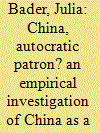| Srl | Item |
| 1 |
ID:
138296


|
|
|
|
|
| Summary/Abstract |
Critics frequently accuse China of acting as a patron for autocratic states. But does Chinese engagement actually increase the stability of authoritarian clients? This article demonstrates that Chinese bilateral interactions have little effect on the longevity of autocratic regimes. Analyses of different forms of Chinese bilateral engagement between 1993 and 2008—including state visits, arms trading, aid projects, economic cooperation, and trade dependence—show that only export dependence on China may increase the likelihood of survival for autocratic regimes while doing little to stabilize their democratic counterparts.
|
|
|
|
|
|
|
|
|
|
|
|
|
|
|
|
| 2 |
ID:
142044


|
|
|
|
|
| Summary/Abstract |
Critiques of China’s ‘oil diplomacy’ center on its alleged disregard for transparency and human rights, yet such claims ignore that the problematic relationship between resource extraction and human rights precedes Chinese market entry. This article explores whether human rights implications are more serious for states exporting oil to China compared to another major oil importer, the United States. Contrary to the conventional wisdom, we argue that oil export dependence on the USA affects human rights more negatively than dependence on China because of differences related to the timing of market entry. The United States established stable relationships with oil supplier states decades ago, creating dependencies that are sufficiently long-term for the implications of the resource curse to take hold, and taking place before human rights became part of the US foreign policy agenda. In comparison, China’s late entry into global oil markets in the early 1990s meant that market access often required the provision of generous loan packages, which may help counteract the detrimental effects of oil dependence. Our empirical analysis examines the impact of oil export dependence on China versus the USA on human rights in supplier states for the 1992–2010 period. Results show that oil producing states dependent on exports to the USA exhibit lower human rights performance than those exporting to China. We also demonstrate that lower human rights performance for US exporters stems from long-term trends rather than short-term fluctuations in oil export dependence.
|
|
|
|
|
|
|
|
|
|
|
|
|
|
|
|
| 3 |
ID:
136162


|
|
|
|
|
| Summary/Abstract |
Does foreign aid prop up authoritarian regimes or is it conducive to democratic reforms? We use a two-level perspective that takes the domestic incentives of both the recipient and the donor into account to review the existent literature respecting this question. By bringing together research on democracy and autocracy with the literature on aid effectiveness and the political economy of aid provision, we provide a political economy perspective against which the mixed effects of foreign aid on political regimes can plausibly be explained. Against this background, research on aid effectiveness may give more attention to incentives in recipient countries and may take on a more comprehensive perspective on international relations. At the same time, the debate on authoritarianism may also gain insight into authoritarian strategies by investigating aid negotiations.
|
|
|
|
|
|
|
|
|
|
|
|
|
|
|
|
| 4 |
ID:
164677


|
|
|
|
|
| Summary/Abstract |
This article uses the issue area of global internet governance to investigate US hegemony in the face of a rising hegemonic challenger, China. The paper exploits the controversies around the revised International Telecommunication Regulations at the 2012 World Conference on International Telecommunications in order to examine the preferences of individual states with regard to the internet's basic principles and whether these were influenced from the outside. A quantitative analysis shows that domestic political structures that substantively clash with US liberalism, together with the unequal spread of ICT across the globe, best explain the adoption of the new regulations. There is only minimal evidence of hegemonic influence; security and trade relations were not found to influence state positions. However, aid from the US pushed autocracies toward alignment with these power's preferences. No such effect was found for democracies.
|
|
|
|
|
|
|
|
|
|
|
|
|
|
|
|